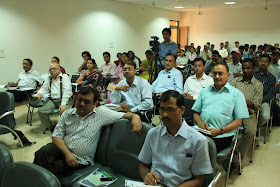21st Century is an era where information is being unleashed at an explosive rate and the challenge is to find relevant content that can be used to construct learning.
To picture the 21st Century Learning Tools to the students and teachers of Institute of Professional Studies, University of Allahabad, with the initiative of Mr. G.K Rai Director, IPS on 27th August 2011 a workshop “21st Century Learning Tools” was organized.
Prof. M.M Pant, the Former Pro-Vice Chancellor, IGNOU is an internationally renowned expert specializing in pedagogy, technology and the development of tools and curricula for 21st century education along with Mr. K Sachdeva and Mrs. Rakhi Wadhwa Sachdeva were present to preside over the workshop.
Prof. Rai rendering the epitome of the workshop stated that in spite of breathing in the 21st century our educational institutions are not contemporary whereas they are working in old models of higher education. We enroll huge number of students, and at the end of the day degree is our ultimate aim. India was once considered a land of snakes, fakeers and elephants but today we stand in a position where Mr. Obama the President of The United States
Prof. M.M Pant continued by highlighting on the Aim of the workshop “Learn to Learn”. To make your learning quality and world class you need to learn from many sources. And this is the age where there is explosion of information it’s up to your caliber how you use it effectively. Thinking and analytical power should be increased by utilizing the facilities you have. It is required to cultivate a spirit of effective learning and widening the horizons of your applicable knowledge. If you can only do what you are thought to do then it’s a mere work of a robot. The aim is to make you do what is unexplored. The sorry state of our educational system is that we cannot or we don’t try to think beyond what we have been thought, so the aim is to trigger you to think. To summarize the ultimate aim he stated- “Collectively use 21st century tools to acquire knowledge which is not with us”.
Speaking technically, Mr. K Sachdeva and Mrs. Rakhi Sachdeva Introduced the students and teachers with New Age Learning. This included three steps.
Step 1: Planning and Information Mining.
Step 2: Curation and Making Sense.
Step 3: Collaboration and Presentation and Sharing.
They introduced various tools and applications which could ease and accelerate our projects or similar planning and group activities.
A term Mind Mapping was coined which is a multi utility tool for Planning and Presentation. Brainstorming was another effective concept which included taking ideas from different people without indulging in disapprovals and conflicts, thus saving quality time. Mind mester and freemind are examples of tools which can be used for mind mapping.Information on tools like Gliffy, moneymoon.com, Coolins.com etc was also imparted. Emphasis was laid on search location and defining your need well when it comes to information mining. For the authenticity of the data the concept of Plagiarism was dealt with.
Workshop was very interactive and included activities like mind mapping. Also projects have been assigned to students and teachers.
The brochure says “Investing time and effort in acquiring the skills imparted in this program is perhaps the best decision one can make in preparing oneself for flourishing and thriving in the 21st century”. Being a participant in the workshop I would definitely agree with it.
Richa Tiwari
Student
B.A in Media Studies
University Of Allahabad
Richa Tiwari
Student
B.A in Media Studies
University Of Allahabad






















































